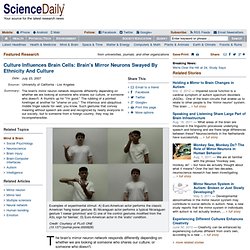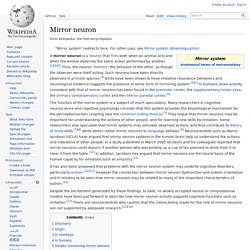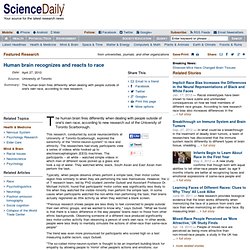

Mirror Neurons. Culture Influences Brain Cells: Brain's Mirror Neurons Swayed By Ethnicity And Culture. The brain's mirror neuron network responds differently depending on whether we are looking at someone who shares our culture, or someone who doesn't.

A thumb's up for "I'm good. " The rubbing of a pointed forefinger at another for "shame on you. " The infamous and ubiquitous middle finger salute for--well, you know. Such gestures that convey meaning without speech are used and recognized by nearly everyone in our society, but to someone from a foreign country, they may be incomprehensible. The opposite is true as well. The answer is yes, reports Istvan Molnar-Szakacs, a researcher in the UCLA Tennenbaum Center for the Biology of Creativity, and Marco Iacoboni, director of the Transcranial Magnetic Stimulation Lab at the Ahmanson-Lovelace Brain Mapping Center of UCLA's Semel Institute for Neuroscience and Human Behavior. In their study, the researchers wanted to investigate the imprint of culture on the so-called mirror neuron network.
Other author's of the study included Allan D. Mirror neuron. A mirror neuron is a neuron that fires both when an animal acts and when the animal observes the same action performed by another.[1][2][3] Thus, the neuron "mirrors" the behavior of the other, as though the observer were itself acting.

Such neurons have been directly observed in primate species.[4] Birds have been shown to have imitative resonance behaviors and neurological evidence suggests the presence of some form of mirroring system.[4][5] In humans, brain activity consistent with that of mirror neurons has been found in the premotor cortex, the supplementary motor area, the primary somatosensory cortex and the inferior parietal cortex.[6] The function of the mirror system is a subject of much speculation. Discovery[edit] Further experiments confirmed that about 10% of neurons in the monkey inferior frontal and inferior parietal cortex have "mirror" properties and give similar responses to performed hand actions and observed actions.
Origin[edit] In monkeys[edit] In humans[edit] Human brain recognizes and reacts to race. The human brain fires differently when dealing with people outside of one's own race, according to new research out of the University of Toronto Scarborough.

This research, conducted by social neuroscientists at University of Toronto-Scarborough, explored the sensitivity of the "mirror-neuron-system" to race and ethnicity. The researchers had study participants view a series of videos while hooked up to electroencephalogram (EEG) machines. The participants -- all white -- watched simple videos in which men of different races picked up a glass and took a sip of water. They watched white, black, South Asian and East Asian men perform the task. Typically, when people observe others perform a simple task, their motor cortex region fires similarly to when they are performing the task themselves. "Previous research shows people are less likely to feel connected to people outside their own ethnic groups, and we wanted to know why," says Gutsell.
Vilayanur S. Ramachandran. Vilayanur Subramanian Ramachandran (born 1951) is a neuroscientist known primarily for his work in the fields of behavioral neurology and visual psychophysics.

He is currently a Professor in the Department of Psychology and the Graduate Program in Neurosciences at the University of California, San Diego. Ramachandran is also Director of the Center for Brain and Cognition affiliated with the UC San Diego Department of Psychology.[1] Ramachandran is noted for his use of experimental methods that make relatively little use of complex technologies such as neuroimaging.
Despite the apparent simplicity of his approach, he has generated many new ideas about the brain.[2] Ramachandran is the author of several books that have garnered widespread public interest. These include Phantoms In the Brain (1999) and The Tell-Tale Brain (2010). Early life and education[edit] Scientific career[edit] Ramachandran is the Director of the Center for Brain and Cognition (CBC). Human vision[edit]